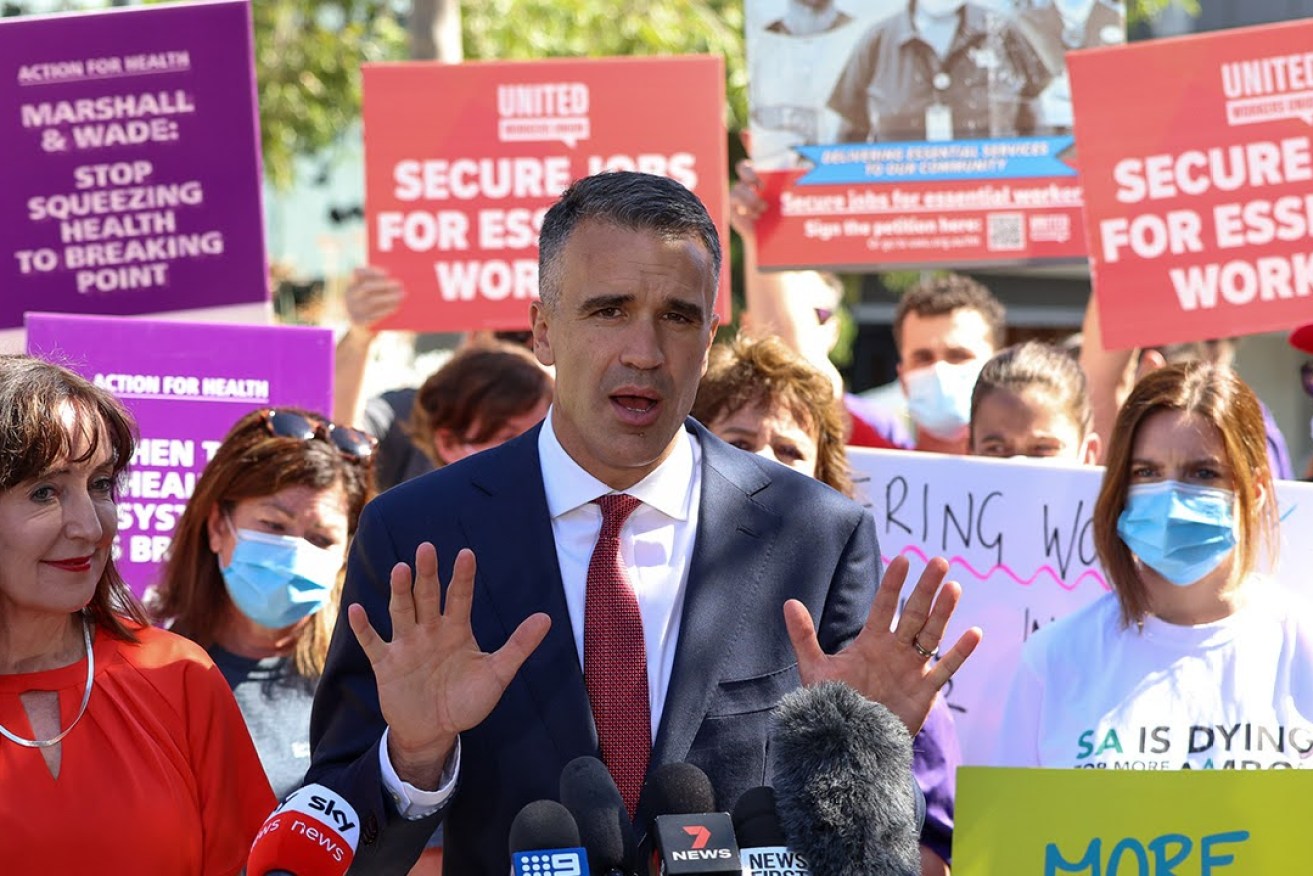Workers’ comp backflip undermines Labor’s health and wellbeing pledge
The Malinauskas Government is risking its credentials on health and wellbeing – the issues at the core of its resounding election victory in March, writes Edward Cavanough.

Peter Malinauskas campaigning on health in the lead-up to the March election. Photo: Tony Lewis/InDaily
Having warned of a potential debt blowout prior to his first budget, it is reasonable that the Treasurer Stephen Mullighan has been on the hunt for savings.
After such loose fiscal settings during COVID, whoever formed government this year was going to have to make tough decisions. Voters accept that.
But for weeks, the State Government has stressed that despite these fiscal challenges, it will not compromise on its core election pledges.
Labor made many promises during the campaign. But if you walk around the streets of Adelaide and ask any punter what issue won Labor the election, you’d probably get the same answer: health.
While the Premier’s swimming pool theatrics didn’t hurt, it was on a promise to protect the health and wellbeing of South Australians that Labor rode to power.
Given this, the Premier’s decision to significantly reduce workers’ compensation entitlements for severely injured SA workers this week should shock South Australians.
Changes to South Australia’s workers’ comp have been foreshadowed for some time, following a court battle between injured truck driver Shane Summerfield and ReturnToWorkSA which proceeded all the way to the High Court, and resulted in Summerfield winning.
It was a complex case, but in essence, Summerfield was suing ReturnToWorkSA because it refused to compensate him fully for injuries sustained on the job.
According to ReturnToWorkSA, the High Court ruling would increase its liabilities – leading to increased insurance premiums for SA businesses.
Last year, Liberal Treasurer Rob Lucas began the work to make changes that would make it harder for severely injured workers to receive adequate workers’ compensation.
It was widely condemned at the time – including by figures within the Labor Opposition.
That’s why Labor’s proposed changes to workers’ comp, which match Lucas’s, are so surprising.
Workers’ comp legislation is complex. But, effectively, the objective of Labor’s plan is to tighten eligibility to workers’ comp for injured workers in order to lower premiums for businesses and to lower costs to ReturnToWorkSA.
Every South Australian should be concerned by these changes — especially frontline workers at high risk of injury such as nurses and ambos.
In prosecuting the case for election, Peter Malinauskas made the case between ‘nice to have’ policies, like investments in basketball stadiums, and ‘need to have’ policies, such as those that enable South Australians to live healthy, dignified lives.
As Labor has historically understood, workers’ compensation is not a ‘nice to have’ – it is a fundamental pillar of the workplace safety net, and integral to maintaining the health and wellbeing of working South Australians.
That workers’ comp comes at a cost is no secret: the Government is right to seek to lower those costs to businesses and to the state.
But to lower the costs associated with workplace injuries, the Government should be working with businesses to reduce the number of workplace accidents — not making sneaky cuts to the support for those hurt on the job.
It is not unusual for new governments to make unpopular decisions in their first budget. Governments spend their political capital in first budgets on challenging and controversial policies, allowing them to buy enough time to recover politically before the next election.
That is clearly the case with Labor’s new workers’ comp policy.
The difference this time, however, is that the consequences are just so dire: the changes, if enacted, will see a number of severely injured workers in South Australia ineligible for adequate workers’ compensation, and driven towards poverty by the time the next election rolls around. Simply, their lives will be worse.
Before the election, Peter Malinauskas emphasised just how powerful the office he sought was.
Critical of the Liberal Government’s inability to be decisive, Malinauskas pledged to do the opposite.
The Premier’s assertive leadership is an admirable trait that gets things done quickly. But on this occasion, his haste to solve a problem looks to put at risk the health and wellbeing of the workers’ who delivered him power.
The solution to the situation being argued by the unions — shelve the bill until consultation is held, undertake an independent actuarial review of ReturnToWorkSA’s Summerfield liability calculations, and launch an investigation into the often criticised workplace culture of ReturnToWorkSA — are eminently sensible and should be considered by the Labor Government.
Treasurer Stephen Mullighan’s first budget looks to have delivered a modest surplus for next year in challenging circumstances.
It’s a good look for the Treasurer and a new Government and will be rewarded with positive coverage.
But the dramatic workers’ compensation backflip, if enshrined in law, risks overshadowing an otherwise commendable achievement.
Edward Cavanough is Director of Policy and SA Lead at the progressive think tank, the McKell Institute. He is a member of the Labor Party.




